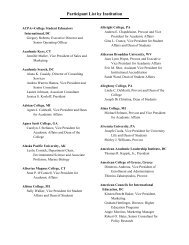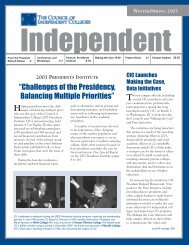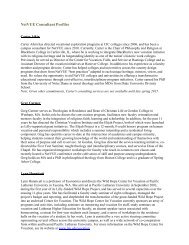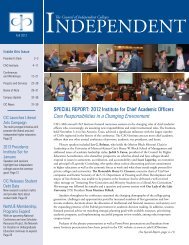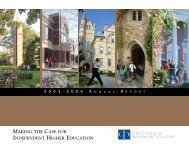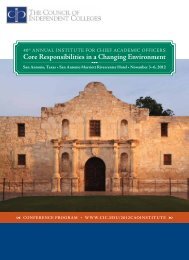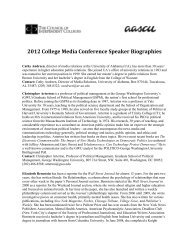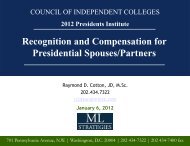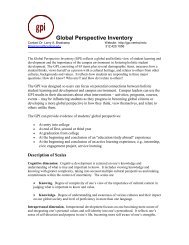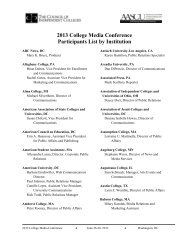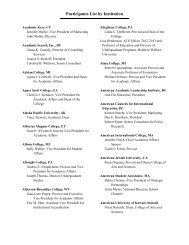Summer 2009 - The Council of Independent Colleges
Summer 2009 - The Council of Independent Colleges
Summer 2009 - The Council of Independent Colleges
You also want an ePaper? Increase the reach of your titles
YUMPU automatically turns print PDFs into web optimized ePapers that Google loves.
ConFerences<br />
CIC Holds Inaugural Vocation Conference; Sets Stage for New Network<br />
CIC hosted the inaugural conference, “Vocation in Undergraduate Education (VUE):<br />
Extending the <strong>The</strong>ological Exploration <strong>of</strong> Vocation,” held March 12–14, <strong>2009</strong>, in<br />
Indianapolis, Indiana, that sets the stage for the launch <strong>of</strong> the Network for Vocation in<br />
Undergraduate Education (NetVUE), building on the success <strong>of</strong> recent campus-based<br />
programs for the theological exploration <strong>of</strong> vocation. <strong>The</strong> meeting featured presentations by<br />
noted scholars, theologians, and campus leaders; sessions about successful campus programs<br />
and challenges to them; and an exchange <strong>of</strong> best practices. <strong>The</strong> conference was generously<br />
supported by Lilly Endowment Inc.<br />
<strong>The</strong> purpose <strong>of</strong> the conference was five-fold: (1) Deepen the understanding <strong>of</strong> the<br />
intellectual and theological substance <strong>of</strong> vocational exploration; (2) Examine the role <strong>of</strong><br />
theological reflection and vocational exploration in a variety <strong>of</strong> institutional contexts; (3) Share<br />
knowledge, best practices, and reflection on experiences among previously involved campuses<br />
and others; (4) Facilitate the incorporation <strong>of</strong> additional colleges and universities into this<br />
enterprise; and (5) Develop a network for sustaining an extended program in the theological<br />
exploration <strong>of</strong> vocation.<br />
An organizational meeting during the conference helped to shape the future development <strong>of</strong> NetVUE. <strong>The</strong> key programmatic<br />
elements <strong>of</strong> NetVUE will include a national conference held every other year, regional gatherings and multi-campus collaborations<br />
held in <strong>of</strong>f-years, online resources and networking, a mentoring and consulting service, and a small NetVUE staff based on a campus to<br />
support these activities. A detailed announcement <strong>of</strong> the Network with a call for membership will be issued in the fall.<br />
Plenary speakers at the VUE Conference included Nathan O. Hatch, president <strong>of</strong> Wake Forest University; Beverly Daniel Tatum,<br />
president <strong>of</strong> Spelman College (GA); and William F. May, Cary M. Maguire Pr<strong>of</strong>essor <strong>of</strong> Ethics Emeritus at Southern Methodist<br />
University. In addition, panels <strong>of</strong> campus leaders addressed such topics as “<strong>The</strong> Varieties <strong>of</strong> Vocational Experience” and “Institutional<br />
Impact <strong>of</strong> Vocational Exploration Programs,” and presenters from a number <strong>of</strong> colleges and universities shared elements <strong>of</strong> their<br />
programs and ideas for strengthening the theological exploration <strong>of</strong> vocation on campus. <strong>The</strong> texts <strong>of</strong> these presentations and other<br />
resources are available on CIC’s website at www.cic.edu/NetVUE.<br />
“Higher Education and the Thirst for Meaning in Life and Work”<br />
Nathan Hatch delivered the keynote address<br />
on the disjunction between what faculty<br />
members teach and the larger issues <strong>of</strong><br />
meaning and purpose. Contemporary life,<br />
said Hatch, is filled with overachievement,<br />
the pr<strong>of</strong>essionalization <strong>of</strong> childhood, and a<br />
culture <strong>of</strong> competition in which one’s identity<br />
is formed by what one does and accomplishes. “<strong>The</strong> young are<br />
increasingly defining their lives and careers with less attention to<br />
meaning…. Many careers are selected for their paychecks and<br />
accolades.” Yet signs <strong>of</strong> acute frustration by young pr<strong>of</strong>essionals—<br />
new lawyers are leaving their careers early, young physicians are<br />
burned out—compounded by the current economic turmoil,<br />
indicate the need to answer the question: What happens when<br />
the high rewards aren’t there Hatch stressed that “students need<br />
to reassess their values” and higher education leaders must focus<br />
on “developing young men and women <strong>of</strong> character who do the<br />
right thing…and learn not just how to make a living but how to<br />
live.”<br />
As such, Hatch noted, colleges must “expand occasions<br />
that challenge students to define their commitments and also<br />
encourage faculty members to help students do this…. Students<br />
yearn to connect with something larger. <strong>The</strong>y want to do good,<br />
and do well, to lead an examined and purposeful life…. How do<br />
we channel these nascent hopes and dreams and relate them to<br />
powerful traditions <strong>of</strong> thought about the meaning <strong>of</strong> work and<br />
the changing state <strong>of</strong> the pr<strong>of</strong>essions”<br />
Hatch noted that, “<strong>The</strong> most pressing question is whether<br />
institutions will have the will and the creativity to sponsor a<br />
substantive range <strong>of</strong> courses in this area.... In all likelihood,<br />
such efforts will be welcomed by some faculty, opposed by<br />
others, and critically observed by a majority to see the fruits<br />
<strong>of</strong> the experiment. To allay suspicion and to build support,<br />
leaders will need to be academically savvy, student-oriented, and<br />
programmatically creative.”<br />
He concluded, “A robust program exploring vocational<br />
discernment should involve rigorous courses on everything from<br />
the history and sociology <strong>of</strong> the pr<strong>of</strong>essions to the meaning <strong>of</strong><br />
vocation in various religious traditions. It should also engage<br />
those <strong>of</strong>fices in our schools that deal with volunteer service,<br />
spiritual formation, and career planning. It will take new energy<br />
and resolve and fresh initiatives if colleges are to recover their<br />
rightful place in helping students discover for themselves what<br />
living is for.”<br />
(continued on page 8)<br />
<strong>Independent</strong> | <strong>Summer</strong> <strong>2009</strong> 7



